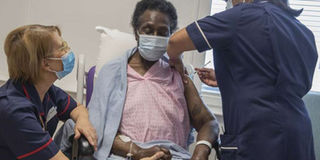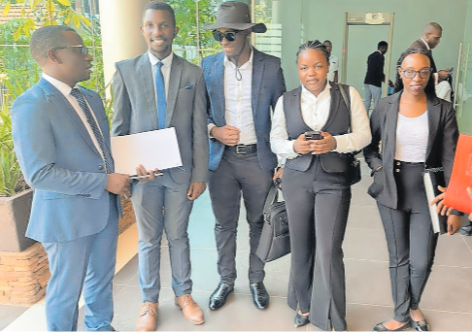Prime
Access, funding hinder Africa’s path to getting Covid-19 vaccine

A woman receives the Pfizer-BioNTech Covid-19 vaccine at the Royal Free hospital in London on December 8. PHOTO/AFP.
What you need to know:
- About 2.3 million people in Africa have contracted Covid-19 to date, of which more than 54,500 have died from the disease.
- African countries are grappling with logistics — how to distribute the vaccines which so far require ultra-cold temperatures.
As many countries around the world are making important decisions about who gets vaccinated against Covid-19, Africa is increasingly on a razor edge as access to the vaccine is not guaranteed.
The challenge facing Africa is access: availability of the required vaccine doses and access to financing to make purchases.
Specifically, Africa is scaling walls in the ongoing global race to access the vaccine as rich countries, representing just 13 per cent of the world’s population, have already cornered more than half (51 per cent) of the promised doses of leading Covid-19 vaccine candidates, according to Oxfam International.
Oxfam analysed the deals that pharmaceutical corporations and vaccine producers have already struck with nations for the five leading vaccine candidates currently in phase 3 clinical trials, based on data collected by Airfinity, the data and science analytics company.
African countries are also grappling with logistics — how to distribute the vaccines which so far require ultra-cold temperatures.
The even harder choice is who gets them first. Scientists recommend people most at risk and those most likely to transmit the virus.
“We are very pleased that the vaccines are beginning to become available but we are concerned about access ...At the moment, the high income countries have pre purchased or purchased the vaccines that are available; our first challenge is to get the vaccines from the manufacturers,” Dr Donald Kaberuka, a member of the Covid-19 African Vaccine Acquisition Task Team told The EastAfrican.
According to the Africa Centre of Disease Control and Prevention (CDC-Africa) Africa needs two billion dozes in order to vaccinate 60 per cent of the population to contain the pandemic, that is, to arrest further transmission and death from Covid-19.
This will cost approximately $12 billion which is expected to come from three sources: the Covax Donor Initiative, the World Bank, and African Import-Export Bank (Afrexim), which has committed to raise up to $5 billion.
“We have a proposal on the table involving African governments accepting to take facilities from the bank (Afrexim) and leveraging some of those resources to provide enough vaccines for the countries,” Dr Kaberuka said, underscoring that African countries cannot rely on charity to access the vaccine.
Meanwhile the East African region just like the rest of Africa is banking on the Gavi Vaccine Alliance initiative — Covax AMC, a financing mechanism that will support 92 low- and middle-income economies’ access safe and effective Covid-19 vaccines.
Under the initiative, only two billion doses may be available by the end of 2021— half of which will go to high-risk and vulnerable people, including frontline health and social care workers.
Last week, speaking at the 2020 virtual Africa Economic Conference, Dr John Nkengasong, director of Africa CDC, said Africa lacks a competent workforce, and remains a spectator of research and development, it is lagging behind other regions in the development of vaccines which a number of developed countries are already working on administering to their citizens.
So far only six countries in Africa have been able to develop diagnostics for the Covid-19 pandemic, including Nigeria, Kenya, South Africa, Senegal and Morocco.
However, he expressed optimism that the continent is ready to deal with the second wave.
“They (African countries) have not ratified the treaty. It does not exist so far after two years. Even if it comes on, they will face challenges as it will be an under-resourced startup and sovereignty will make vaccines a political choice. Unless they resuscitate this agency quickly many Africans will not enjoy access to safe, quality and timely vaccines,” Mr Kawaldip said, underscoring that having a comprehensive vaccination programme is important.
Last week, speaking at the 2020 virtual Africa Economic Conference, Dr John Nkengasong, director of Africa CDC, said Africa lacks a competent workforce, and remains a spectator of research and development, it is lagging behind other regions in the development of vaccines which a number of developed countries are already working on administering to their citizens.
So far only six countries in Africa have been able to develop diagnostics for the Covid-19 pandemic, including Nigeria, Kenya, South Africa, Senegal and Morocco.
However, he expressed optimism that the continent is ready to deal with the second wave.
“The continent is much more prepared to deal with the second wave than we were 11 months ago” he said.
About 2.3-million people in Africa have contracted Covid-19 to date, of which more than 54,500 have died from the disease.




